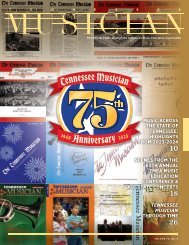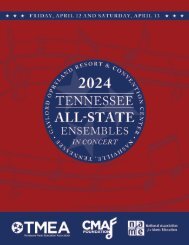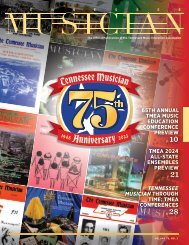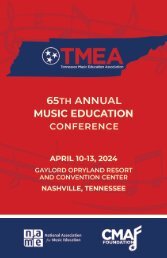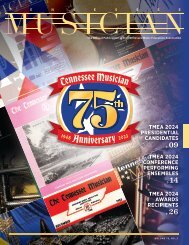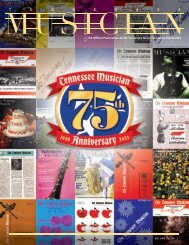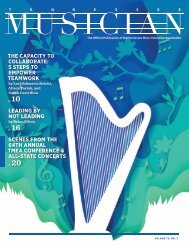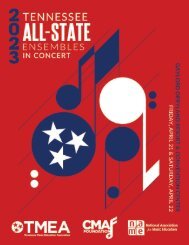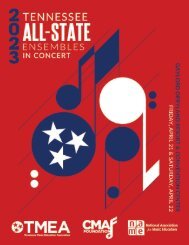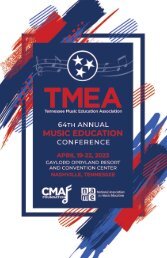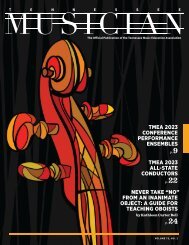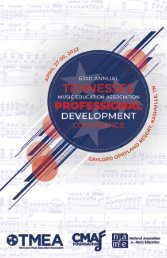TN Musician Vol. 72, No. 3
You also want an ePaper? Increase the reach of your titles
YUMPU automatically turns print PDFs into web optimized ePapers that Google loves.
PROGRAM DIVERSITY<br />
The next observation is in regard to the increasingly diverse<br />
skill sets and prior musical experiences with which<br />
music students come to college, and the possible fit of<br />
those skills in their chosen college. Those of us who claim<br />
music as a profession understand that not all college music<br />
departments look alike. Although we as professional<br />
musicians understand this, students and parents may not. Increasingly,<br />
college and university music departments are diversifying<br />
their curricular offerings; sometimes to meet the needs<br />
of the local community; sometimes to accomplish the goals of a<br />
new administrator on campus; sometimes to meet accreditation<br />
requirements. Through continued growth and curricular innovations,<br />
Tennessee’s college and university music programs have<br />
come to offer quite a diverse array of degree and certificate programs.<br />
What this means for students is that not all students will be<br />
the best fit at their local university, or at their first-choice university.<br />
A student who is skilled in popular music styles will thrive in<br />
some programs but may not even pass an audition into programs<br />
that require traditional music literacy. Therefore, we encourage<br />
you to research the programmatic and curricular offerings of the<br />
community colleges, technical schools, four-year colleges and the<br />
graduate programs across the state to see what each program offers,<br />
and help your students determine where they might fit best<br />
as a prospective music major. Encourage students to pursue many<br />
options, but prioritize the program that best suits their skills, experiences,<br />
and career goals.<br />
DUAL CREDITS<br />
Increasingly, high schools are seeking opportunities to offer dual-enrollment<br />
credits to the point that many students graduate<br />
with an associate’s degree at the same time they complete high<br />
school. For high school music educators, this may result in an increased<br />
interest and enrollment in Music Appreciation and Music<br />
Theory courses, especially if college credit is an option. If you are<br />
interested in pursuing this for your campus, we offer these considerations:<br />
First, communicate with your campus and system-level administration<br />
to see if dual-credits are an option for your school<br />
system. If so, the school will have most likely partnered with a local<br />
college or community college where the credits will transfer.<br />
Next, you will need to have some graduate-level music course<br />
work. Some institutions require a master’s degree with 18-hours<br />
in music while others will only require 18 graduate music hours.<br />
Finally, as your class will provide both high school and college<br />
level credit, you will need to arrange some details with administrators<br />
on both campuses. You will most likely be hired as an adjunct<br />
faculty at the college where students will receive credit. You<br />
may be asked to create two different syllabi; one that addresses the<br />
syllabus requirements of each campus. You may be asked to use a<br />
specific textbook required of the college. You should also be observed<br />
and evaluated by an administrator from the college music<br />
program in addition to your school system’s required observation<br />
process. These extra steps add a layer or two of extra paperwork,<br />
but are necessary to ensure the college addresses its accreditation<br />
requirements for students receiving credit from one or more of<br />
its programs.<br />
TENNESSEE PROMISE<br />
We are officially four to five years into Tennessee Promise. This<br />
program has made college available to thousands of students who<br />
would not have otherwise been able to obtain a college degree. In<br />
light of the benefits of the program, there are some factors that<br />
music students should consider before they decide whether to<br />
pursue college through <strong>TN</strong> Promise or through a traditional program.<br />
The primary consideration is that not all community colleges<br />
offer music classes, lessons, or ensembles. Therefore, a student interested<br />
in pursuing a four-year music degree may complete all<br />
of the general education requirements at a community college,<br />
transfer to a four-year school to complete a bachelor’s degree, and<br />
would then need to start-over as a freshman to complete the fouryear<br />
music course sequence in most music degrees. As a result,<br />
it may take a minimum of six or seven years to complete a program<br />
that should have only taken four years to complete. If you<br />
have students considering <strong>TN</strong> Promise and who plan to complete<br />
a four-year degree, encourage them to thoroughly research their<br />
college options. Make sure they are aware of the music offerings at<br />
the community colleges they are considering, and of the transition<br />
from community college to four-year school.<br />
TMEA RESOURCES<br />
I<br />
would like to close this article with a reminder that TMEA offers<br />
a wealth of college-level music education resources that<br />
are accessible to anyone. Collegiate NAfME (CNAfME) is a nationwide<br />
organization of music majors who plan to become music<br />
teachers. In Tennessee, the college chapters are organized by a<br />
TMEA board member, and by a campus-level chapter sponsor.<br />
The chapter sponsor is usually the music education coordinator<br />
at the local college who can also be a very valuable resource to<br />
those of you in K-12 music education. You can find a complete list<br />
under the Board/Council tab on the “About Us” menu option at<br />
www.tnmea.org. Additionally, the TMEA board includes a Higher<br />
Education chairperson who coordinates the activities of the<br />
college-level music education programs within the association.<br />
Finally, you are always welcome to reach out to us, the directors,<br />
chairs, deans and administrators of the music units at Tennessee’s<br />
higher education institutions. We value the work that you do and<br />
look forward to continued work with you.<br />
Dr. Eric Branscome joined the Austin<br />
Peay State University Music Department<br />
in the fall of 2011 as Coordinator<br />
of Music Education and became<br />
Department Chair in the fall 2017 semester.<br />
He teaches undergraduate and<br />
graduate courses in music education,<br />
supervises music student teachers, and<br />
is the founder and director of Camp<br />
Granada, APSU’s elementary music<br />
summer day camp. He was the recipient<br />
of the 2012 Socrates Award for Excellence<br />
in Teaching, the 2014 Harold<br />
Love Community Service Award, and<br />
the 2016 Outstanding Advising Award.<br />
18 | TENNESSEE MUSICIAN | 2020 | <strong>Vol</strong>ume <strong>72</strong>, <strong>No</strong>. 3



